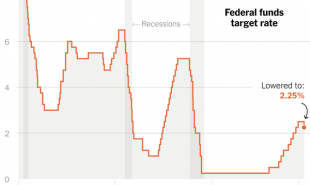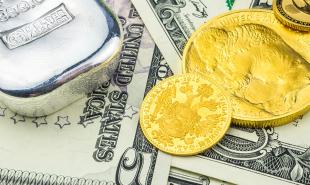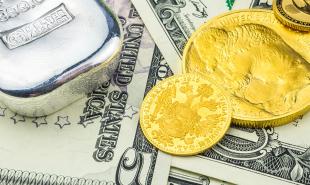
Ohhh, f***ing Christmas!*
*What an HSBC trader said to his colleague when he was given an order in which he front ran, made a market on, and booked a large “implicit fee” for his hard work.

For What it’s Worth
How is it that there are still defenders of smaller less liquid futures pricing mechanisms as legitimate given that the bulk of their volume trades outside the futures market. Worse, the trusted price transparency of futures in these “tail wags dog” markets can be used to manipulate much bigger deals that do not touch the futures?
After reading Matt Levine’s excellent article below differentiating the manipulation risks to retail in principle (prop desk) vs agency (brokerage) executions in context of the HSBC front running case a few things came to mind on manipulation and how clients get the short shrift in financial transactions.
Fx, Bonds, Stocks are Manipulated
It is a fact that markets like Bonds, Stocks, and FX markets all get manipulated either by “rogue” traders with no consent by their bosses, firms whose culture and pay structures prioritize profit before client service, or because we are collectively a country of laws and not ethics which encourages the gray area to be exploited.
If it is also a fact that each one of these markets’ daily trading notional dollar value eclipses the amount needed to own every above ground ounce of Gold in the world, with Stocks being the only possible exception. This should make manipulating each of those markets much harder than a market like Gold or Coffee.
Gold, not so much..
Given that it is generally easier to manipulate markets, whether it be for short periods or longer time frames in which:
- counterparty diversity is lacking,
- liquidity is dependent on a small consortium of players,
- price discovery is still opaque,
- and generally the investment community is more simplistic in their approach to finance (think buy and hold types, poorly run producers, and nations like Venezuela whose whole misunderstanding of financial risk always makes them saps at the table)
Yet we still have no convictions or major headlines. We have only settlements in a product that has traded OTC largely for over 100 years. This is of course because there isn’t as much money at stake, not a big enough case for a regulator to make a career on, not an asset that anyone cares about anymore etc.
This is not about Gold or Silver. This is about human nature and the risk of power and corruption. Coffee, Sugar, and other products in hands of a few concentrated players are all “managed” at one time or another. But none of them gives the incentive to manipulate like Gold does.
As a still widely watched indicator of inflation Gold is on every central bank’s radar as something that must be watched because of its persistence as a thermostat for inflation, geopolitical uncertainty, and in general a store of value. This on top of their owning some in reserve.
It seems to me that the only possible explanation of the persistence of manipulation deniers is that their definition of manipulation is not the same as those who claim manipulation exists.
Vincent B. Lanci
Authored by Bloomberg’s Matt Levine
HSBC.
In 2011, traders at HSBC Holdings Plc got a big order to buy $3.5 billion worth of pounds sterling for a corporate client at the 3 p.m.fixing price. "Ohhhh, f***ing Christmas," responded HSBC trader Mark Johnson. (To his colleague, I mean. They kept a straight face to the client.) HSBC proceeded to buy sterling in the minutes leading up to the 3 p.m. fix, pushing up the price. By the time of the fix, that price was pretty high -- higher than the average price HSBC had paid -- and it was able to sell the client the pounds it had bought at a big premium, making about an $8 million profit. Years later, U.S. authorities decided that this was a crime, and charged Johnson with that crime, and yesterday he was convicted of the crime.
What was the crime? Formally, it was "wire fraud," because everything is wire fraud. Informally, it was a "Multimillion-Dollar Front Running Scheme," according to the Justice Department's original announcement of the charges. And you can see the intuitive appeal of calling it "front running." After all, HSBC had an order to buy pounds for the client. It bought pounds for its own account and then profited by selling those pounds to the client. That looks like what is commonly called -- in the stock market, for instance -- "front running."
But customs and norms in the foreign exchange markets are different. In the stock market, if I tell a broker to buy me 100 shares of Apple stock, she goes out and buys me 100 shares of Apple stock and sells them to me at the price she paid (plus a commission). If she buys 100 Apple shares for herself first, pushes up the price, and then turns around and sells them to me, that is obviously bad front-running and clearly prohibited. But in the FX market, if I tell HSBC at 2:30 to buy me $3.5 billion worth of pounds at the 3 p.m. fix, it buys $3.5 billion worth of pounds for itself, and then sells them to me at whatever the price is at 3 p.m. It can buy the pounds before 3 p.m., or after 3 p.m.; that's its business. (It can try to buy them at 3 p.m. on the dot, but for a big order that will be tough.) But normally it will buy lots of pounds before 3 p.m., because that is the sensible risk-mitigating approach: If it has to sell $3.5 billion worth at 3 p.m., it should try to get long a lot of pounds by then, in order to balance its books.
This is sometimes called "pre-hedging," and at Johnson's trial he testified that it was normal and accepted, but you don't have to take his word for it. When the U.K. Financial Conduct Authority fined HSBC in 2014 for doing bad FX stuff, it specifically noted that a bank "legitimately managing the risk arising from its net client orders at the fix rate" might make a profit, and push up the fix rate, by "buying a large volume of currency in the market just before or during the fix." This is different from "front running" in the stock market, because FX fixings are an at-risk principal market, where "front running" is just not that useful a concept. (Here is a good explanation from Dan Davies.)
So the basic front-running thing that Johnson was convicted of was ... probably legal?
Now that doesn't mean everything was great. There is "legitimately managing the risk arising from its net client orders," and then there is "banging the pound up as much as possible to make a huge profit at the fix." The "Christmas" line, and other discussions about how much room HSBC had to push up the price before the client would "squeal," hint at the latter, which is at least bad customer service. The fact that the HSBC traders told the client that the pound's pre-fixing price moves were due to trading by "a Russian name," instead of their own gleeful buying, also suggests dishonesty, maybe even wire fraud.
So the jury's verdict is not necessarily wrong. Still it is sort of a worrying thing to put to a jury. How much do you trust a jury of lay people to decide whether HSBC's FX execution was or was not within reasonable professional standards? How confident are you that they can draw nuanced distinctions between pre-hedging and front-running? How confident are you that those distinctions even really exist, or that conduct on the wrong side of them should be a felony? If juries end up deciding which gray-area trading practices are fine, and which are crimes, then the ones that come with embarrassing sweary phone calls are probably going to end up being crimes. That might be sort of satisfying, but is it fair?
Lloyd Blankfein is handing out toasters.
Well, not really, but he is calling retail borrowers on the phone to make sure they're happy:
He introduces himself as Goldman Sachs CEO Lloyd Blankfein and asks about their their experiences with the bank’s personal loan product. Marcus issues loans ranging from $3,500 to $30,000 to individual consumers, a big departure from Goldman’s traditional client base.
I wonder if Goldman is getting good value from those calls. When Blankfein goes to a meeting with a big -- or medium-sized -- corporate or institutional client, the client feels special; it knows that it is getting Goldman's full attention and best possible efforts. Corporate and institutional clients understand the symbolism of having Blankfein show up at a meeting. People borrowing $3,500 from Goldman's website strike me as less likely to be impressed by Blankfein's personal touch. (Also, even if they are impressed, they are less likely to mandate Goldman on a $50 billion merger.) Still I suspect that those calls are more fun for him than the big merger pitches are. "So, what are you gonna use the money on," he can ask, and people will say things like "redoing my kitchen" or "fixing my car" or "bailing my brother out of jail." It's so much more human and gossipy than "synergies."
Meanwhile at JPMorgan Chase & Co.:
Chase today unveiled Finn by Chase℠, a new all-mobile bank that gives consumers greater control of their everyday spending and saving - and happiness - through a completely mobile experience.
Finn℠ offers a new perspective on banking through customized tools that help consumers build savings and reflect on everyday spending, from a daily cup of coffee to a vacation with friends.
The bank designed Finn by working closely with millennials for more than a year to understand their unique money challenges and what influences their spending. Research found that emotions played a large part in their decisions, but they didn’t have a way to understand the impact it had on their financial lives.
“When it comes to money, millennials told us they don’t want to feel like they’re being judged,” said Bill Wallace, CEO of Digital at Chase. “So, we designed Finn to put them in charge, no matter where or how they’re spending.”
I am sorry for that very long block quote but I found it impossible to omit any of those sentences. Even cutting it off there, you miss out on the bullet point about how millennials can "assign emojis for how those purchases made them feel." It is definitely one of my top 10 favorite press releases about mobile bank apps. Disclosure: I bank with Chase, and use its mobile app, but as of this morning I have the regular old-person mobile app rather than the cool millennial app. My Chase banking app has never asked me about my feelings, but to be fair it also never makes me feel like I'm being judged either. It just ... I know I am going to sound like such an old fogey here but ... it just lets me deposits checks and check my balances and payments.
Oh I guess another disclosure is that I used to work at Goldman Sachs Group Inc., and I was there when Goldman became a bank holding company, and there was definitely a lot of joking about handing out toasters back then.
Also you know Goldman's Marcus online-lending product is named after Marcus Goldman, the founder of Goldman Sachs, right? Who is Finn named after? I hope John Pierpont Morgan had a less famous cousin named Finn. Millennials love authenticity, and giving your app a charming human first name that isn't the name of your founder seems, dare I say it, inauthentic?
Elsewhere in apps: "TD Ameritrade Clients Can Now Trade Stocks on Facebook Messenger." I assume that wasn't some dumb random choice; I assume that people wanted that, or at least that well-informed market-research types concluded that people would want that. So much of human experience is so alien to me.
Venezuela.
Here's a good entry for the "Owe your banker £1000 and you are at his mercy; owe him £1 million and the position is reversed" file:
If PDVSA were to deliver the funds even one day late, investors can rally together to demand the immediate payment of the rest of the money they’re owed. (Lacking the funds to pay back all the debt at once, Venezuela would likely look to enter into restructuring talks with creditors -- a step that’s complicated by the sanctions.)
It isn’t clear, to be sure, that investors would want to immediately escalate the situation. For one, getting 100 cents on the dollar a few days, or even weeks, late would be much less painful than enduring legal battles and restructuring negotiations that are likely to drag on for months, if not years. What’s more, analysts estimate that creditors could get as little as 30 cents on the dollar in the end. There’s broad reluctance to unnecessarily upset the gravy train, even if it’s showing signs of tipping over.
That's from this Bloomberg News storyabout how Venezuela has two big bond principal payments due in the near future -- one from its government oil company Petróleos de Venezuela SA on Friday, and another from the government next week -- and may have trouble coming up with the money, or getting it to bondholders even if it does come up with it, due to "U.S. financial sanctions that have spooked banks and other intermediaries in the bond payment chain." Ordinarily not paying back bonds when they are due gets the bond issuer into trouble. But Venezuela is already in trouble: Its economy is in crisis, and that, plus the sanctions, makes it hard for it to borrow any more in international debt markets. But its bondholders are mostly doing fine, keeping their heads down and mostly receiving their principal and interest payments. Upsetting that equilibrium has little upside for them, and while it does have downside for Venezuela -- acceleration of Venezuelan bonds could, in theory, one day lead to creditors seizing Venezuela's hard-currency-generating oil assets abroad -- bondholders seem unlikely to be tempted to use that leverage.
Oops.
Oh well:
UniCredit kicked off the eurozone bank earnings season this morning by publishing its third quarter results more than a fortnight early after accidentally sending them to analysts and investors yesterday evening.
If you're keeping track of major corporate spreadsheet errors, this is the first one I can think of that was apparently caused by hidden columns:
The bank said the decision to release early was taken after a table with “preliminary and incomplete” third quarter results was accidentally uploaded to the bank’s website late yesterday afternoon and distributed.
The third quarter figures were “contained in two columns which were hidden, but accessible”, UniCredit said.
There are no good choices after that: If you do release the results officially two weeks before you were planning to, then they are likely to have errors; but if you don't release the results officially, then all the people who knew to click to access the hidden columns will have better (or maybe worse!) information than everyone else. But probably what will happen is that the preliminary results will be more or less fine, and in some ways that will be the most embarrassing thing about it. What do they need the extra two weeks for, if today's release turns out to be fine?
Blockchain blockchain blockchain.
Honestly this seems high:
Of the 226 ICOs analyzed, only 20 -- such as Storj, Augur and TenX -- are used in the running of their networks, according to Token Report, which keeps a database of token sales information. The rest can only be traded, and are purely speculative instruments, Galen Moore, chief executive officer of Token Report, said in an interview.
So there are 20 utility tokens with utility! Good for them. What will happen when the other 206 actually come on line and are useful? (Here I am assuming that all 226 initial coin offerings involve teams that are actually working to build networks that will run using their currencies, and will succeed in doing so.) Will that increase their value, as things that are currently pure speculative investments become useful ways to pay for cloud storage? Or is speculating on the future of finance a bit sexier than buying decentralized cloud storage? Will people want those coins as much when they're used for paying for stuff, instead of trading purely on hype and dreams?
Elsewhere here is a claim:
Most people think of Bitcoin as a digital asset, but it can be thought of as something more general than that: a decentralized organization. Years from now, Satoshi’s creation may be looked at as a catalyst for the slow death of the firm.
That's from Nick Tomaino, who argues that "Bitcoin is the first example of an organizational structure that has the beneficial characteristics of the firm (minimizing transaction costs, aggregating capital and mindshare, and providing job security for contributors)" without centralized ownership or decision-making, and that it will lead to "the Slow Death of the Firm" as people realize that decentralized blockchain-based organizations are better than actual firms.
I think that this is a misreading of the Coasean framework: Coase contrasts the firm and the market, and blockchainy organizations are mostly just trying to re-introduce the market -- and its transaction costs -- where before there were firms. Those transaction costs are reduced by the existence of computers, though they are are also increased by using those computers to solve complicated cryptographic puzzlesbefore recording any transactions. But the point is that fundamentally bitcoin is not about some middle path between the firm and the market, or inventing a new kind of firm; it's about distrusting the concept of the firm. Cryptocurrency enthusiasts essentially don't believe that intentional decision-making could in some contexts be better than market mechanisms. Perhaps they are right, and this time is different, and we have reached a technological singularity in which transaction costs are negligible and firms should not exist and all decisions should be made by markets and price signals.
On the other hand, cryptocurrency's actual track record of disrupting the firm is comically terrible. Remember The DAO, "a new breed of human organization" run on the blockchain with no centralized decision-making? Remember how it raised tens of millions of dollars, which were immediately stolen? Firms exist because of real human difficulties with uncertainty and coordination and long-term planning and the difficulty of renegotiating every transaction; it is not obvious that those difficulties could be solved with cryptography.
Elsewhere, a rich man said: "I just don’t believe in this bitcoin thing. I think it’s just going to implode one day. I think this is Enron in the making." (The speaker here is Prince Alwaleed, though the sentiment is shared more widely.) And: "DRW leads high frequency trading charge into cryptocurrencies." And: "Bitcoin Pioneer Says New Coin to Work on Multiple Blockchains."
People are worried about bond market liquidity.
A relatively rare entry in this series from the U.K., where the Bank of England's Bank Underground blog has a post asking "Do investors amplify or cushion corporate bond market sell-offs?" The answer is:
For the sterling corporate bond market we find that asset managers generally buy bonds after an increase in yields. But, based on their behaviour during the 2013 ‘taper tantrum’, we find that their behaviour flips in stressed market conditions: they sell bonds, perhaps exacerbating the sell-off.
"For asset managers," they note, "particularly in the case of open-ended investment funds, the procyclical behaviour during the ‘taper tantrum’ could have reflected a need to sell assets to meet redemptions."
Things happen.
Ill-Timed Uber Investment Roils a Giant Saudi Fund. Two Sigma’s rapid rise to top of quant hedge fund world. "The list of former equities people in big jobs on Wall Street is short." Mongolia to Revisit Offshore Dollar Bond Market. Commerzbank hires advisers as takeover interest builds. ECB Must Strike Right Balance in Scaling Back Bond Purchases. Battle hots up for London clearing business post-Brexit. White House’s Muddled Tax Message Clouds Pitch for Trump Plan. Trump Says ‘No Change’ to 401(k) Plans Under Forthcoming Tax Proposal. "In the case of a large tax cut next year, a Taylor Fed could well turn out to be more dovish than a Yellen Fed." Trump Says He’s ‘Very, Very Close’ to Naming Fed Chair Nominee. Amazon Says 238 Places Want to Host Its New Headquarters. Snap has "hundreds of thousands" of unsold Spectacles. Supersized Family Farms Are Gobbling Up American Agriculture. "All compression algorithms expand their contents on average." Thieves Rob Drunk LES Bargoers by Just Asking for Their Stuff, Police Say. Millennials are ditching religionfor astrology. Universe shouldn’t exist, CERN physicists conclude.
If you'd like to get Money Stuff in handy email form, right in your inbox, please subscribe at this link. Thanks!
Bloomberg L.P. ● 731 Lexington Avenue, New York, NY 10022
Read more by Soren K.Group







